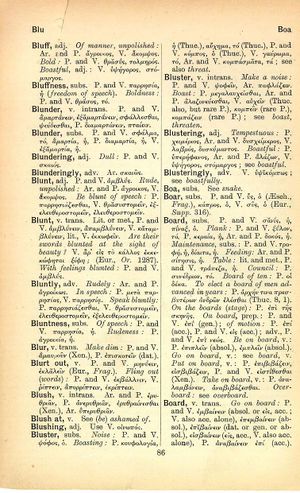blunt: Difference between revisions
From LSJ
Τὸ νικᾶν αὐτὸν αὑτὸν πασῶν νικῶν πρώτη τε καὶ ἀρίστη. Τὸ δὲ ἡττᾶσθαι αὐτὸν ὑφ' ἑαυτοῦ πάντων αἴσχιστόν τε ἅμα καὶ κάκιστον. → Τo conquer yourself is the first and best victory of all, while to be conquered by yourself is of all the most shameful as well as evil
(Woodhouse 2) |
(CSV3) |
||
| Line 1: | Line 1: | ||
{{ | {{Woodhouse1 | ||
| | |Text=[[File:woodhouse_86.jpg|thumb|link={{filepath:woodhouse_86.jpg}}]]'''adj.''' | ||
P. and V. [[ἀμβλύς]]. | |||
<b class="b2">Rude, unpolished</b>: Ar. and P. [[ἄγροικος]], V. [[ἄκομψος]]. | |||
<b class="b2">Be blunt of speech</b>: P. παρρησιάζεσθαι, V. θρασυστομεῖν, ἐξελευθεροστομεῖν, ἐλευθεραστομεῖν. | |||
'''v. trans.''' | |||
Lit. or Met., P. and V. ἀμβλύνειν, ἀπαμβλυνειν, V. καταμβλύνειν, lit., V. ἐκκωφεῖν. | |||
<b class="b2">Are their swords blunted at the sight of beauty?</b> V. ἆρʼ εἰς τὸ [[κάλλος]] ἐκκεκώφηται ξίφη; (Eur., ''Or.'' 1287). | |||
<b class="b2">With feelings blunted</b>: P. and V. [[ἀμβλύς]]. | |||
}} | }} | ||
Revision as of 09:23, 21 July 2017
English > Greek (Woodhouse)
adj.
P. and V. ἀμβλύς.
Rude, unpolished: Ar. and P. ἄγροικος, V. ἄκομψος.
Be blunt of speech: P. παρρησιάζεσθαι, V. θρασυστομεῖν, ἐξελευθεροστομεῖν, ἐλευθεραστομεῖν.
v. trans.
Lit. or Met., P. and V. ἀμβλύνειν, ἀπαμβλυνειν, V. καταμβλύνειν, lit., V. ἐκκωφεῖν.
Are their swords blunted at the sight of beauty? V. ἆρʼ εἰς τὸ κάλλος ἐκκεκώφηται ξίφη; (Eur., Or. 1287).
With feelings blunted: P. and V. ἀμβλύς.

